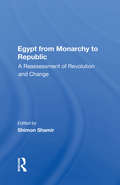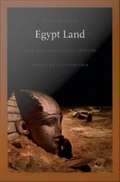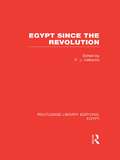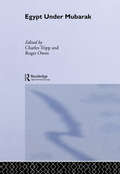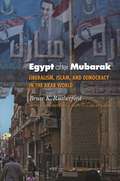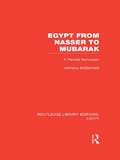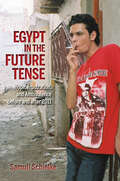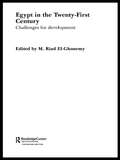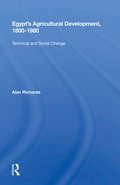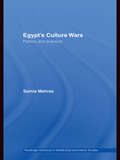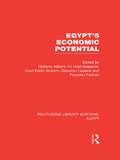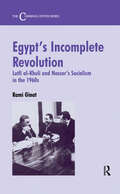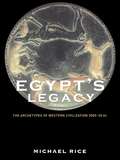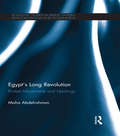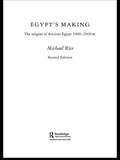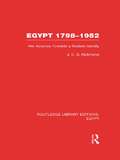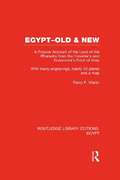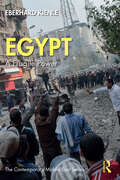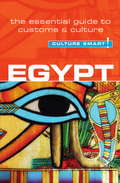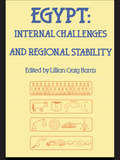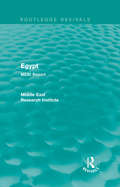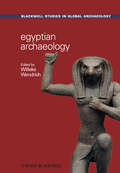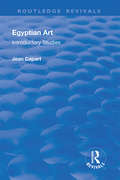- Table View
- List View
Egypt From Monarchy To Republic: A Reassessment Of Revolution And Change
by Shimon ShamirAn examination of the extent to which Nasser's 1952 coup d'etat brought about significant changes in the basic social, political and cultural structures of Egypt.
Egypt Land: Race and Nineteenth-Century American Egyptomania
by Scott TraftonEgypt Land is the first comprehensive analysis of the connections between constructions of race and representations of ancient Egypt in nineteenth-century America. Scott Trafton argues that the American mania for Egypt was directly related to anxieties over race and race-based slavery. He shows how the fascination with ancient Egypt among both black and white Americans was manifest in a range of often contradictory ways. Both groups likened the power of the United States to that of the ancient Egyptian empire, yet both also identified with ancient Egypt's victims. As the land which represented the origins of races and nations, the power and folly of empires, despots holding people in bondage, and the exodus of the saved from the land of slavery, ancient Egypt was a uniquely useful trope for representing America's own conflicts and anxious aspirations. Drawing on literary and cultural studies, art and architectural history, political history, religious history, and the histories of archaeology and ethnology, Trafton illuminates anxieties related to race in different manifestations of nineteenth-century American Egyptomania, including the development of American Egyptology, the rise of racialized science, the narrative and literary tradition of the imperialist adventure tale, the cultural politics of the architectural Egyptian Revival, and the dynamics of African American Ethiopianism. He demonstrates how debates over what the United States was and what it could become returned again and again to ancient Egypt. From visions of Cleopatra to the tales of Edgar Allan Poe, from the works of Pauline Hopkins to the construction of the Washington Monument, from the measuring of slaves' skulls to the singing of slave spirituals--claims about and representations of ancient Egypt served as linchpins for discussions about nineteenth-century American racial and national identity.
Egypt Since the Revolution (Routledge Library Editions: Egypt)
by P. J. VatikiotisAs the leaders of a revolutionary, nationalist regime, the Egyptian Free Officers who came to power following the 1952 Revolution committed themselves to the attainment of goals associated with modernization, namely rapid economic development based on State planning and industrialization and the political mobilization of society along State-decreed lines. Arising from a conference held at the Centre of Middle Eastern Studies at SOAS, with contributions from scholars from the Arab world, Europe and the US as well as the UK, these papers raise the questions most important to students of economic and political development.
Egypt Under Mubarak (SOAS/Routledge Studies on the Middle East)
by Charles Tripp Roger OwenEgypt is one of the major powers in the Middle East. The vigour of its cultural life and the extent of its influence make it a force which cannot be ignored in the Arab world. Yet, despite the comparative confidence with which its rulers handle power, the country has a politically contradictory past with which to come to terms, as well as its role in a region of shifting political identity and allegiance. This book examines the causes and consequences of the many crises within the Egyptian political, sociological, economic and moral legacy and the strategies which Mubarak's government has devised to cope with that legacy. The book's concern is for the capacity of the present administration to avoid expediency and the generation of further crisis and rather to employ Egypt's considerable resources in the shaping of a distinct and effective role for the country.
Egypt after Mubarak: Liberalism, Islam, and Democracy in the Arab World (Princeton Studies in Muslim Politics #48)
by Bruce K. RutherfordWhich way will Egypt go now that Husni Mubarak's authoritarian regime has been swept from power? Will it become an Islamic theocracy similar to Iran? Will it embrace Western-style liberalism and democracy? Egypt after Mubarak reveals that Egypt's secularists and Islamists may yet navigate a middle path that results in a uniquely Islamic form of liberalism and, perhaps, democracy. Bruce Rutherford draws on in-depth interviews with Egyptian judges, lawyers, Islamic activists, politicians, and businesspeople. He utilizes major court rulings, political documents of the Muslim Brotherhood, and the writings of Egypt's leading contemporary Islamic thinkers. Rutherford demonstrates that, in post-Mubarak Egypt, progress toward liberalism and democracy is likely to be slow. Essential reading on a subject of global importance, this edition includes a new introduction by Rutherford that takes stock of the Arab Spring and the Muslim Brotherhood's victories in the 2011-2012 elections.
Egypt and the Limits of Hellenism
by Ian S. MoyerIn a series of studies, Ian Moyer explores the ancient history and modern historiography of relations between Egypt and Greece from the fifth century BCE to the early Roman Empire. Beginning with Herodotus, he analyzes key encounters between Greeks and Egyptian priests, the bearers of Egypt's ancient traditions. Four moments unfold as rich micro-histories of cross-cultural interaction: Herodotus' interviews with priests at Thebes; Manetho's composition of an Egyptian history in Greek; the struggles of Egyptian priests on Delos; and a Greek physician's quest for magic in Egypt. In writing these histories, the author moves beyond Orientalizing representations of the Other and colonial metanarratives of the civilizing process to reveal interactions between Greeks and Egyptians as transactional processes in which the traditions, discourses and pragmatic interests of both sides shaped the outcome. The result is a dialogical history of cultural and intellectual exchanges between the great civilizations of Greece and Egypt.
Egypt from Nasser to Mubarak: A Flawed Revolution (Routledge Library Editions: Egypt)
by Anthony McDermottEver since Nasser overthrew Prince Farouk in 1952, Egypt has held a special, leading position within the Arab world. It is now facing major problems, the most serious of which are the growing strength of the Muslim fundamentalists, continuing population growth and external debt problems. Together, these are creating a volatile and potentially explosive climate. In this book, the journalist Anthony McDermott examines the development of Egypt from Revolution to the present, describing various features of Egyptian society and the contributions of its leaders. He asks whether Egypt has fulfilled its expected role as the model for Arab and developing countries or whether the peace pact made by Sadat with Israel was a major error, causing Egypt’s withdrawal under Mubarak from the centre of international politics. The book is lively and readable and provides a challenging introduction to the development and problems of the largest country in the Middle East. First published 1988.
Egypt in Italy
by Molly Swetnam-BurlandThis book examines the appetite for Egyptian and Egyptian-looking artwork in Italy during the century following Rome's annexation of Aegyptus as a province. In the early imperial period, Roman interest in Egyptian culture was widespread, as evidenced by works ranging from the monumental obelisks, brought to the capital over the Mediterranean Sea by the emperors, to locally made emulations of Egyptian artifacts found in private homes and in temples to Egyptian gods. Although the foreign appearance of these artworks was central to their appeal, this book situates them within their social, political, and artistic contexts in Roman Italy. Swetnam-Burland focuses on what these works meant to their owners and their viewers in their new settings, by exploring evidence for the artists who produced them and by examining their relationship to the contemporary literature that informed Roman perceptions of Egyptian history, customs, and myths.
Egypt in the Future Tense: Hope, Frustration, And Ambivalence Before And After 2011 (Public Cultures Of The Middle East And North Africa Ser.)
by Samuli SchielkeAgainst the backdrop of the revolutionary uprisings of 2011-2013, Samuli Schielke asks how ordinary Egyptians confront the great promises and grand schemes of religious commitment, middle class respectability, romantic love, and political ideologies in their daily lives, and how they make sense of the existential anxieties and stalled expectations that inevitably accompany such hopes. Drawing on many years of study in Egypt and the life stories of rural, lower-middle-class men before and after the revolution, Schielke views recent events in ways that are both historically deep and personal. Schielke challenges prevailing views of Muslim piety, showing that religious lives are part of a much more complex lived experience.
Egypt in the Twenty First Century: Challenges for Development (Routledgecurzon Advances In Middle East And Islamic Studies #No.2)
by M. Riad El-GhonemyThe book focuses on three main themes:*overpopulation associated with low productivity, unemployment, persistent poverty and weak savings and investment capacity*the post-1950 development strategies and their outcomes*the institutional structures that are constraining economic and political progress. Egypt in the Twenty First Century is a much need
Egypt's Agricultural Development, 1800-1980: Technical And Social Change
by Alan RichardsThis book uses both microeconomic theory and social and political analysis to show how the interaction of social classes, technical change, government policy, and the international and state systems have shaped Egypt's agricultural development.
Egypt's Culture Wars: Politics and Practice (Routledge Advances in Middle East and Islamic Studies #Vol. 13)
by Samia MehrezThis ground-breaking work presents original research on cultural politics and battles in Egypt at the turn of the twenty first century. It deconstructs the boundaries between ‘high’ and ‘low’ culture drawing on conceptual tools in cultural studies, translation studies and gender studies to analyze debates in the fields of literature, cinema, mass media and the plastic arts. Anchored in the Egyptian historical and social contexts and inspired by the influential work of Pierre Bourdieu, it rigorously places these debates and battles within the larger framework of a set of questions about the relationship between the cultural and political fields in Egypt.
Egypt's Economic Potential (Routledge Library Editions: Egypt)
by Roberto AliboniOver the last ten years the Egyptian economy has undergone a major transformation which has led to greater decentralisation and international competition. This transformation, along with changing circumstances in the surrounding Arab areas and the end of hostilities with Israel, has given a boost to the Egyptian economy. Without underestimating the obstacles that still stand in the way of sustained economic growth and development, this book foresees a more optimistic outlook for Egypt than do other such studies carried out by international organisations such as the World Bank. Egypt’s Economic Potential argues that the main problem facing the Egyptian economy is that the government must resort to expensive public expenditure policies, in particular subsidising foodstuffs, in order to maintain the political consensus. This creates a savings gap which prevents the authorities from channelling savings towards financing the projects which will cerate economic growth. However, the book suggests that because the present regime is fundamentally stable and even further change at the top would be unlikely to alter the institutional framework of the country, the Egyptian economy has the potential for stable and rapid growth.
Egypt's Incomplete Revolution: Lutfi al-Khuli and Nasser's Socialism in the 1960s
by Rami GinatThe importance of Lutfi al-Khuli and the intellectual circle associated with the Nasserist regime is examined here. Rami Ginat looks at al-Khuli's contribution to the short-lived yet formidable success of Arab socialism.
Egypt's Legacy: The Archetypes of Western Civilization: 3000 to 30 BC
by Michael RiceDrawing on Jungian psychology to show why Egypt has been so important in the history of Western civilisation, Michael Rice explains the majesty and enduring appeal of Egyptian civilization. Jung claimed that there exist certain psychological drives dormant in our shared unconscious: these are the archetypes. From the omnipotent god to the idea of the nation state, the formulation of most of these archetypes is owed to ancient Egypt. Michael Rice sets out to recover the sense of wonder that the Egyptians themselves felt as they contemplated the world in which they lived, and the way they expressed that wonder in the religion, art and literature. He traces the story of Egyptian civilization from its emergence in the third millennium BC to its transformation following the Macedonian conquest in 30 BC.
Egypt's Long Revolution: Protest Movements and Uprisings (Routledge Studies in Middle Eastern Democratization and Government)
by Maha AbdelrahmanThe millions of Egyptians who returned to the heart of Cairo and Egypt’s other major cities for 18 days until the eventual toppling of the Mubarak regime were orderly without an organisation, inspired without a leader, and single-minded without one guiding political ideology. This book examines the decade long of protest movements which created the context for the January 2011 mass uprising. It tells the story of Egypt’s long revolutionary process by exploring its genealogy in the decade before 25 January 2011and tracing its development in the three years that have followed. The book analyses new forms of political mobilisation that arose in response to ever-increasing grievances against authoritarian politics, deteriorating living conditions for the majority of Egyptians as a consequence of neo-liberal policies and the machinery of crony capitalism, and an almost total abandoning by the state of its responsibilities to society at large. It argues that the increasing societal pressures from different quarters such as labour groups, pro-democracy movements and ordinary citizens during this period culminated in an intensifying culture of protest and activism that was vital in the lead up to the dramatic overthrow of Mubarak. It, also, argues that the features of these new forms of activism and political mobilisation have contributed to shaping the political process since the downfall of Mubarak. Based on research undertaken since 2002, Egypt’s Long Revolution is an essential resource for scholars and researchers with an interest in social movements, comparative politics and Middle East Politics in general.
Egypt's Making: The Origins of Ancient Egypt 5000-2000 BC
by Michael RiceAlready a classic and widely used text, this second edition has been wholly revised and updated in the light of the many discoveries made since its first publication. Michael Rice's bold and original work evokes the fascination and wonder of the most ancient period of Egypt's history. Covering a huge range of topics, including formative influences in the political and social organization and art of Egypt, the origins of kingship, the age of pyramids, the nature of Egypt's contact with the lands around the Arabian Gulf, and the earliest identifiable developments of the historic Egyptian personality. Egypt's Making is a scholarly yet readable and imaginative approach to this compelling ancient civilization.
Egypt, 1798-1952: Her Advance Towards a Modern Identity (Routledge Library Editions: Egypt)
by J.C.B. RichmondEgypt was the first of the Arab-speaking Muslim countries to come into close contact with modern European states. The experience was not a particularly happy one. It resulted in political and economic subjugation and in the breakdown of her traditional culture and society: but it led also to her emancipation from the Ottoman Empire and to the eventual development of a modern and autonomous Egyptian identity. The central aim of this book is to trace the history of Egypt during this period of change, from Napoleon’s invasion at the end of the eighteenth century to the Free Officer’s Revolution in the middle of the twentieth. The author describes the effects of European – particularly British and French – involvement on the course of Egyptian history, shown variously for example in her changing trade pattern, in her forced participation in two world wars and in the planning and construction of the Suez Canal. One of these effects was to stimulate the development of Egyptian nationalism and the emergence of her own leaders. A major factor in the course of Egyptian history, and one of which the author is constantly aware, was the European ignorance of Islamic and Arabic thought and attitudes, which was largely responsible for the misunderstandings and conflicts which characterized the period. The book provides a valuable analysis of interaction between communities with different and sometimes opposing value systems. To understand this interaction is essential to the study of the history, politics and culture of the Middle East.
Egypt, Old and New: A popular account. With many engravings, nearly 50 coloured plates and a map (Routledge Library Editions: Egypt)
by Percy Falcke MartinA work of history, culture, politics, economics, packed with period photographs and period insights.
Egypt: A Fragile Power (The Contemporary Middle East)
by Eberhard KienleFocusing on authoritarian rule, unresolved economic challenges, and external dependency, the volume explains the salient political and economic features of contemporary Egypt against the backdrop of its history since the beginning of the 19th century. Presenting a comprehensive account of developments, it challenges common assumptions about secularists, Islamists, and revolutionaries, as well as 'modernization', 'economic reform', and political stability. Discussing domestic politics, economic change, and external relations since 1945, the author argues that Egypt continued to draw a degree of strength from sustained state-building activities, which its pre-colonial rulers could pursue in a favourable international environment and the partly related emergence of the country as a focal point of collective identity. More consolidated than many other states in the global south, Arab and non-Arab alike, independent Egypt, despite changing economic strategies, remained a (lower) middle-income country and despite repeated political contestation, most recently in the Arab Spring, continued to suffer from autocratic rule. Such continuity reflects not only the interplay between political forces at home, dominated by the military, and inconclusive economic policies but also the external constraints under which governments and other actors in the global south have to act. Based on numerous primary and secondary sources in various languages, including Arabic, and years of fieldwork, the book is a key resource for scholars of all levels, journalists, policymakers, and diplomats interested in comparative politics and the political economy of the Middle East and Egypt.
Egypt: Culture Smart!
by Jailan ZayanThe best-selling Culture Smart! series continues where other guides leave off. Whether you are travelling on business or pleasure, long-term or short, Culture Smart! is your pocket-sized cultural roadmap that never goes out of date. Providing essential information on attitudes, beliefs and behaviour in different countries, these concise guides enable you to steer clear of embarrassing mistakes, feel confident in unfamiliar situations, and arrive at your destination with local knowledge on what to expect and how to behave. Culture Smart! has become as essential as remembering to pack your passport. Be a responsible traveller with Culture Smart!, the smarter way to travel.
Egypt: Internal Challenges and Regional Stability
by Lillian C HarrisKassem provides a concise and accessible introduction to Egypt, including chapters on domestic politics, foreign policy, economy and state formation. It will be of interest to anyone studying Egypt from a social science perspective.
Egypt: MERI Report (Routledge Revivals: Middle East Research Institute Reports)
by Middle East Research InstituteFirst published in 1985, this study, focusing on Egypt, looks at the underlying reasons why certain political, economic and social events have taken place in the country’s history. It provides vital analysis of the political and economic issues of the country, and those that have affected it, as well as providing statistical material on all the key data of the political economy.The book was originally published as part of the Middle East Research Institute (MERI) Reports on the Middle East which quickly established themselves as the most authoritative and up-to-date information on the state of affairs in the region.
Egyptian Archaeology (Wiley Blackwell Studies in Global Archaeology #15)
by Willeke WendrichEgyptian Archaeology explores ancient Egypt using a uniquely archaeological approach, drawing on original research to both synthesize and challenge existing scholarship. Written by leading Egyptologists, based on original research and fieldwork Illustrates how practical research is a vital component of any theory-based discussion about the ancient world Examines the cultural and historical processes of ancient Egypt from a global perspective Visually engaging with over 80 illustrations Chapters explore fundamental issues and themes, but focus on specific periods and key archaeological sites
Egyptian Art: Introductory Studies (Routledge Revivals)
by Jean CapartOriginally published in 1923, this book provides an exploration of Egyptian art. Drawing on environmental factors of the Egyptian region, architecture, history and Egyptian society, Capart also provides an insight into the psyche of the Egyptian artist.
